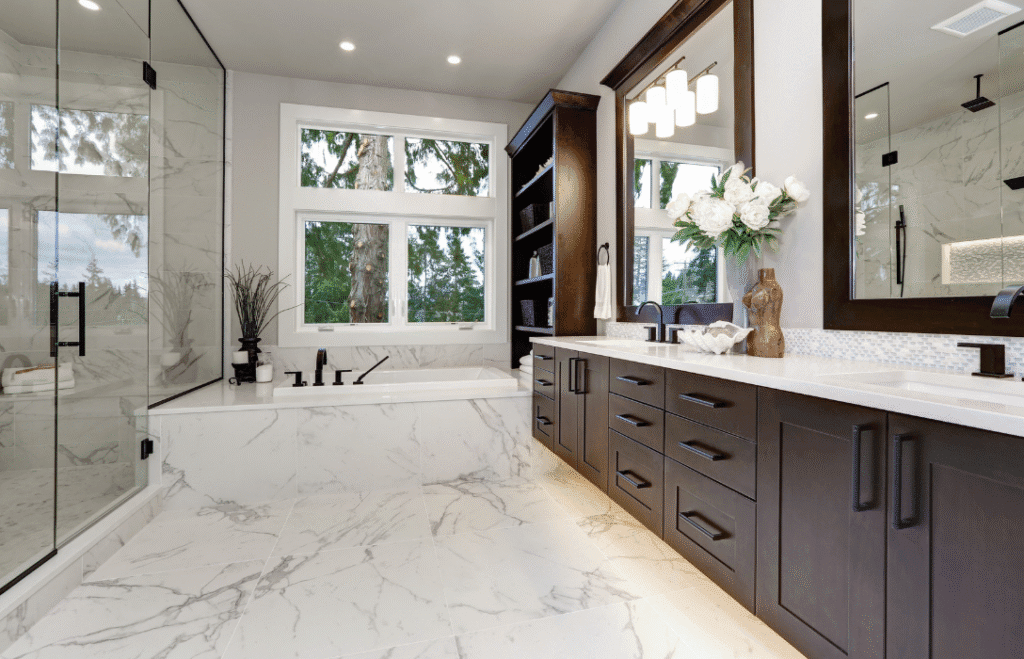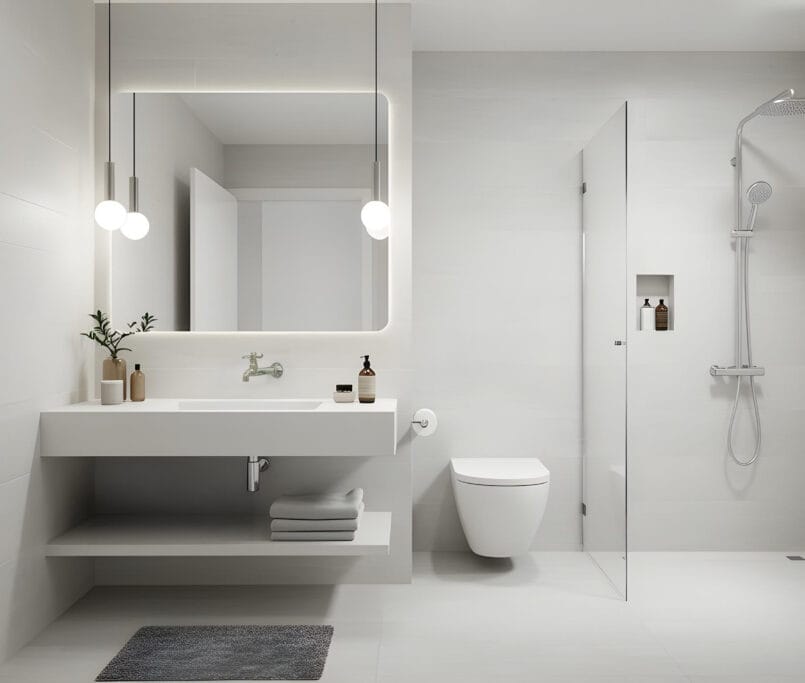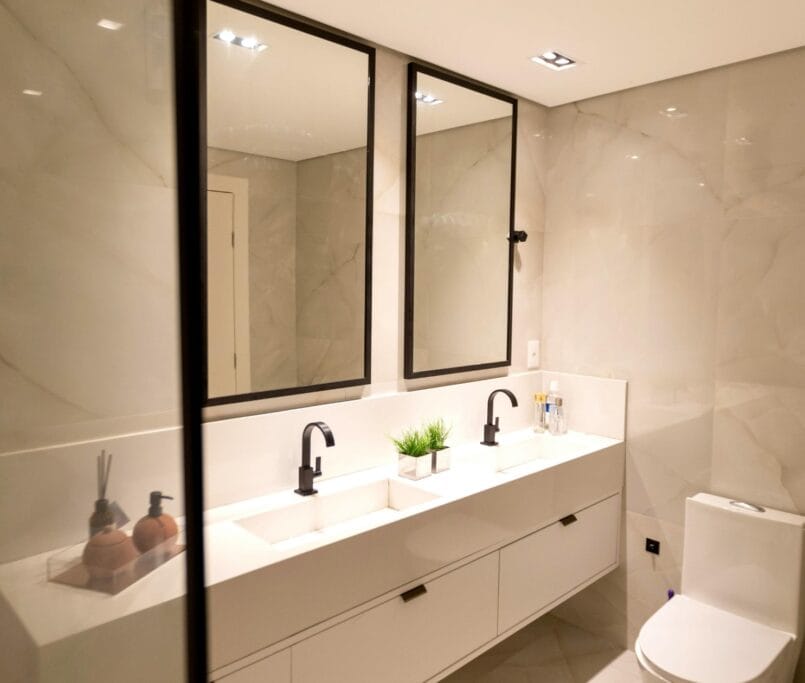Best Waterproof Flooring Options for Bathrooms: A Complete Guide
Why Choosing the Right Waterproof Flooring for Your Bathroom is Crucial
Bathrooms are one of the most moisture-heavy areas of any home, and this moisture can wreak havoc on flooring. From splashes during a shower to steam and spills, your bathroom floor is constantly exposed to water. Choosing the right waterproof flooring is not just a matter of aesthetics, but also practicality. Water-resistant flooring plays a crucial role in maintaining a safe, clean, and long-lasting bathroom environment.
Without proper waterproofing, bathroom floors can become damaged over time. Issues like mold, warping, and stains can not only affect the look of your bathroom but can also lead to costly repairs. For this reason, opting for flooring solutions that can withstand the test of time, moisture, and temperature changes is essential.
In this blog, we’ll explore the best waterproof flooring options for bathrooms, detailing each type’s benefits, drawbacks, and how they can elevate the functionality of your space. Whether you’re renovating or simply replacing your existing floor, finding the right material can help you avoid the common pitfalls that come with moisture and dampness.
If you’re planning a bathroom remodel and don’t know where to start, this guide is for you. We’ll cover everything from budget-friendly options to premium materials, all designed to keep your bathroom floor dry, safe, and beautiful.
When it comes to waterproof flooring for your bathroom, there are several options available, each offering distinct advantages. From vinyl, which is affordable and easy to install, to porcelain tile, which provides unmatched durability, selecting the right material is crucial to ensuring long-term performance. In this article, we will focus on the best waterproof flooring options, breaking down each option’s suitability, cost, and maintenance requirements.
Why Waterproof Flooring Matters in Bathrooms
Bathrooms are highly prone to water exposure, making the need for waterproof flooring critical. Moisture buildup can lead to several problems, such as:
- Mold and mildew growth: Humidity can cause mold to thrive in spaces with poor ventilation.
- Water damage: Wooden floors or porous materials can absorb water, leading to warping or rotting.
- Slips and falls: Wet floors can be slippery, especially if the material doesn’t offer traction.
Waterproof flooring is a game-changer, addressing all these issues while ensuring the longevity and beauty of your bathroom floor. It prevents water from seeping into the subfloor, thus preventing damage. Additionally, it contributes to a healthier home environment by minimizing mold and mildew.
Top Waterproof Flooring Options for Bathrooms
1. Vinyl Flooring
Vinyl is one of the most popular choices for bathroom flooring due to its affordability, versatility, and ease of installation. It’s available in several forms, including luxury vinyl planks (LVP) and sheet vinyl. The material is waterproof, easy to clean, and provides a variety of style options that mimic wood, stone, or tile.
Pros:
- Budget-friendly
- Easy installation (DIY-friendly)
- Available in various styles and designs
- Durable and easy to clean
Cons:
- May not have the same luxurious feel as other materials
- Can be scratched or dented by heavy objects
2. Porcelain or Ceramic Tile
Porcelain and ceramic tiles are known for their durability and aesthetic appeal. They are completely waterproof when installed properly and come in a wide range of styles, shapes, and sizes. These tiles are particularly suited for bathrooms that receive heavy foot traffic.
Pros:
- Long-lasting
- Easy to clean and maintain
- Wide range of styles
- Resists mold and mildew growth
Cons:
- Expensive installation (if hiring a professional)
- Cold and hard surface underfoot
- Grout can stain and require maintenance
3. Engineered Wood Flooring
Engineered wood is a great option for those who love the look of natural wood but need something more water-resistant. This flooring features a top layer of real wood over a plywood base, making it more stable in damp environments.
Pros:
- Beautiful, natural wood look
- More water-resistant than solid wood
- Can be refinished
Cons:
- Expensive
- Can warp with prolonged water exposure if not sealed properly
4. Rubber Flooring
Rubber flooring offers excellent water resistance and is very safe for bathrooms, especially in homes with children or elderly family members. Its cushioned nature provides comfort and reduces the risk of slips and falls.
Pros:
- Slip-resistant
- Comfortable underfoot
- Easy to clean
- Available in various colors and designs
Cons:
- Limited aesthetic appeal compared to other materials
- Can be damaged by heavy objects or sharp edges
5. Natural Stone (e.g., Slate, Granite)
For those seeking a high-end, luxurious look, natural stone is an excellent option. Materials like slate or granite are naturally resistant to water, and their unique texture can elevate the overall bathroom design.
Pros:
- Luxurious, elegant appearance
- Very durable and resistant to water
- Increases property value
Cons:
- Expensive material and installation
- Requires sealing to maintain water resistance
- Can be slippery when wet unless textured tiles are used
Real-Life Problems: The Challenges of Choosing the Right Flooring
Choosing the right flooring material is not always a straightforward process. Here are some common issues that homeowners face when selecting bathroom flooring:
- Budget constraints: While porcelain and stone tiles offer durability, they can be costly. Vinyl flooring, on the other hand, is affordable but may not give the same aesthetic appeal as other materials.
- Moisture levels: Some flooring options, like wood, require additional maintenance to keep them waterproof. It’s crucial to choose a material that will perform well in your specific bathroom environment (e.g., high humidity, high traffic).
- Aesthetic preferences: Many people want a bathroom that feels like a luxurious retreat, but they might not realize that some high-end materials require more maintenance and are not as water-resistant as cheaper options.
These challenges can be mitigated by doing thorough research and consulting with a professional who can recommend the best waterproof flooring options for your specific needs.

How to Maintain Waterproof Flooring in Your Bathroom
Regardless of which waterproof flooring material you choose, proper maintenance is crucial for longevity. Here are a few tips for keeping your bathroom floors in top condition:
- Regular cleaning: Sweep and mop your floors regularly to remove dirt and prevent buildup.
- Seal grout lines (for tiles): Grout can absorb water, so make sure to seal it periodically to prevent stains and moisture infiltration.
- Use rugs or mats: Place absorbent mats near the sink, shower, or tub to reduce water exposure on the floor.
By following these simple steps, you can keep your waterproof floors looking great for years.
Cost of Waterproof Flooring Options for Bathrooms
When considering waterproof flooring for your bathroom, cost is an important factor. Here’s a quick price comparison:
- Vinyl flooring: $2 – $7 per square foot
- Porcelain or ceramic tile: $3 – $15 per square foot
- Engineered wood: $5 – $12 per square foot
- Rubber flooring: $4 – $8 per square foot
- Natural stone: $10 – $30 per square foot
Remember that while some materials may have a higher upfront cost, they can provide long-term savings by reducing the need for repairs and replacements.
Conclusion: Make the Right Choice for Your Bathroom Renovation
Choosing the right waterproof flooring is one of the most important decisions you’ll make during your bathroom remodel. Each material has its own set of advantages and challenges, but the key is finding the one that best suits your style, budget, and practical needs.
At Grand Building Construction, we specialize in bathroom renovations, helping homeowners choose the perfect waterproof flooring for their spaces. Contact us today for a consultation and let us help you transform your bathroom into a beautiful, functional retreat!
Ready to remodel your bathroom with the best waterproof flooring? Contact us today to schedule your consultation!
FAQs
Q1: What is the most affordable waterproof flooring for bathrooms?
Vinyl flooring is generally the most budget-friendly option, offering a wide variety of styles without compromising water resistance.
Q2: How long does waterproof flooring last in a bathroom?
When properly installed and maintained, waterproof flooring can last 10 to 30 years, depending on the material.
Q3: Can I install waterproof flooring myself?
Certain materials like vinyl and rubber flooring can be installed as DIY projects, but tiles and engineered wood might require professional installation for the best results.




